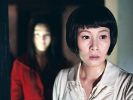Eye For Film >> Movies >> The Matrimony (2007) Film Review
Ghostly goings on have rarely looked so gorgeous as they do in this spooky little period story from Teng Hua-Tao. Chinese cinephiles may be interested to note that it (along with Li Shaohong's The Door) is billed as mainland China's first full-blooded horror film in years, since, until recently, the censors there have taken a very dim view of supernatural subject matter seen as being both at odds with the sunny spirit of the nation and liable to promote unecessary violence within its storylines.
In fact, "horror" is rather too strong a word for this atmospheric tale - set against a richly evoked 1930s backdrop - which is spiced with the supernatural rather than attempting to provide out and out shocks. Although there is a ghost, this is first and foremost a tale of doomed romance and of obsession and possession.

Since the film looks so luscious it seems fitting that the main protagonist is a cinematographer Junchu (Leon Lai), who we meet just as his life is about to crumble around him courtesy of an accident (the film's only technically weak moment) which kills his about-to-be-fiancee Manli (Fan Bingbing). Flashing forward several months, Junchu has been married off to Sansan (Liu Rene) a mouse of a woman who is utterly devoted to him despite his claims that his mother duped him into tying the knot and dubbing her "no more a guest in this house".
It is another, far less welcome, guest that Sansan has to worry about, since the ghost of Manli isn't just hanging around in her fiance's imaginings. Junchu has dedicated a room to his lost love, and spends many of his evenings pining there, while listening to a tape recording of Manli beseeching him to never forget her, little realising that her spirit cannot forget either and that the frequent illness 'attacks' he has are her attempts to touch him. After coming face to face with this ghost of girlfriend past, events prompt the spirit and Sansan to broker a deal... but this 'positive possession' may not be as benevolent as it first appears.
Hua-Tao has masterful control of his colour palette. Manli wears a bright red dress from the outset - a smart choice, since red is both the colour worn by brides at Chinese weddings and associated with anger and vengeance when it comes to ghosts and folklore. Her red presence is offset by the cool blue colours of Sansan and Junchu's home. Add to this the white favoured by Sansan (a shade often symbolising death) and the colour coding helps Hua-Tao deftly control the mood and tension. His choice of camera position - frequently hovering near the ceiling, voyeuristically taking in the action from a distance, also serves to reinforce the idea that Sansan and Junchu are being watched by something not quite on this plane of existence.
Some of the music cues are a little heavy-handed but the overall scoring matches both the mood and jazziness of the time period well. The pace is snappy - perhaps a little too much so, towards the end as things begin to race to a conclusion - and the film's coda, while no doubt a big help when it came to getting the film past the Chinese censors, is daft compared to what has gone before. Still, this is a lovingly wrought and interestingly pitched film that shows there is at least as much pain and horror to be found in unrequited love and obsession as there is in death.
Reviewed on: 07 Oct 2009


















